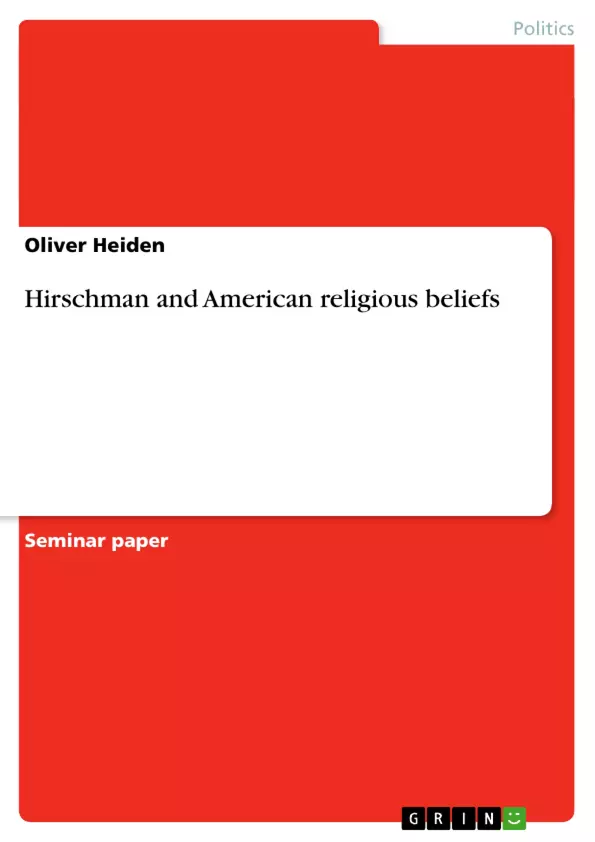In his most important contribution to political economy Exit, Voice, and Loyalty, Albert O. Hirschman describes two essential options for responding to decline in firms, organisations and states. Although, Hirschman primarily investigates the reaction of customers/members in the case of decline in quality of a product/a service of a firm/an organisation, his analysis demonstrates that his concept is applicable not only to commercial enterprises and political organisations but also to a wide variety of communities such as families, religious groups or nations. In this spirit, he also examines American ideology for those two recuperation mechanisms, exit and voice. In his analysis, Hirschman explains that exit is an intrinsic recuperation mechanism typical of US Americans. Thus, he draws a quite coherent picture of American ideology and practice, where economy, politics, and social behaviour are based upon the preference for exit over voice. While this preference is especially plausible in the realm of economy, Hirschman also demonstrates that American social phenomena such as individual mobility, significant income disparity or national patriotism can be derived form the particular favour of American thought upon exit. Hirschman himself, however, does not link this theory to such an important and decisive issue as religion. The purpose of this paper is to make up for this lack to some extent, i.e. to find out whether there is a link to discover between those two ideas, the exit-ideology and the American faith.
Inhaltsverzeichnis (Table of Contents)
- Introduction
- The concept of Exit and Voice
- Exit in the American Ideology and Practice
- Roots of American religious beliefs
- Origin of American religious belief
- Main influences of religion in the contemporary United States
- American religious beliefs today
- Church type
- Sect type
- Mystical type
- Radical religious individualism and the Exit option
- Summary
Zielsetzung und Themenschwerpunkte (Objectives and Key Themes)
This paper aims to examine whether there is a link between the exit-ideology as outlined by Hirschman and American religious beliefs. It argues that the exit option, which involves leaving a situation rather than trying to solve it from within, has been particularly prevalent in American culture and society.
- The concept of exit and voice in American society
- The influence of religious beliefs on American ideology and practice
- The historical roots of American religious beliefs
- The role of radical religious individualism in the context of exit-ideology
- The relationship between exit-ideology and the American way of life
Zusammenfassung der Kapitel (Chapter Summaries)
The introduction presents Hirschman’s theory of exit and voice, highlighting its application to American ideology. It argues that the American tradition favors exit over voice, and investigates the historical and social factors contributing to this preference.
The chapter on the concept of exit and voice delves into Hirschman’s theory, contrasting exit, which involves leaving a situation, with voice, which involves addressing problems from within. The chapter explores the role of these mechanisms in different social and economic systems, particularly in relation to the American context.
The chapter on exit in the American ideology and practice examines the historical roots of the American preference for exit, tracing it back to the colonial period and the flight of settlers from Europe. It explores how this preference has manifested in various aspects of American life, including social mobility and individual success.
The chapter on the roots of American religious beliefs outlines the significant role religion has played in American history and ideology. It discusses the influence of Puritanism on American political thought and the emergence of religious pluralism in the colonies.
The chapter on American religious beliefs today explores the contemporary landscape of American religion, examining the three types of religious beliefs as defined by Ernst Troeltsch: church, sect, and mystical type. It discusses the emergence of religious individualism and its implications for American society.
The chapter on radical religious individualism and the exit option investigates the relationship between exit-ideology and the rise of religious individualism. It argues that the preference for exit fosters a need for personal belief systems that provide support and guidance for individuals making irrevocable decisions.
Schlüsselwörter (Keywords)
Key terms and concepts examined in this paper include exit-ideology, voice, American religious beliefs, Puritanism, religious pluralism, radical religious individualism, American civil religion, social mobility, and the American way of life.
Frequently Asked Questions
What is Hirschman's "Exit, Voice, and Loyalty" theory?
It describes two options for responding to decline: "Exit" (leaving the organization) and "Voice" (trying to improve it from within).
How does the "Exit" option relate to American ideology?
The US history is rooted in "Exit" (immigrants leaving Europe), which shaped a culture favoring individual mobility and leaving suboptimal situations.
Is there a link between American religion and the Exit option?
Yes, the American religious landscape is characterized by high pluralism and radical individualism, where people "exit" one faith for another frequently.
What are Troeltsch's three types of religious beliefs?
Ernst Troeltsch defined the church type, the sect type, and the mystical type, which are used to analyze contemporary American faith.
Why is religious individualism so strong in the US?
The preference for Exit fosters a need for personal belief systems that support individual decisions without relying on traditional institutions.
- Arbeit zitieren
- Dipl.-Volkswirt (BA) Oliver Heiden (Autor:in), 2007, Hirschman and American religious beliefs, München, GRIN Verlag, https://www.grin.com/document/75424



